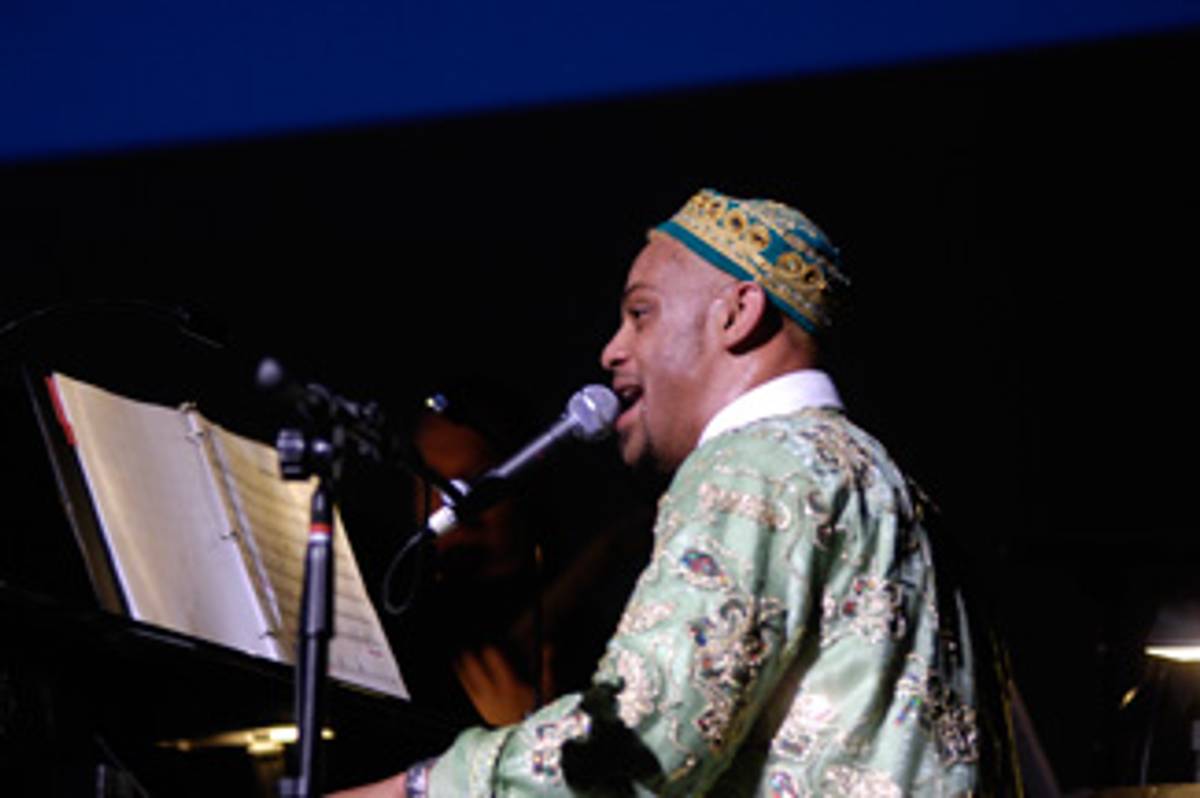“Gospel” and “Jewish music” tend to be mutually exclusive, but Joshua Nelson—an African-American Jew raised in an Orthodox household—has fused the two together, and attached a label that gives his sound instant cachet: Kosher Gospel.

At age 33, Nelson has done to Jewish music what Bob Dylan did to folk rock and John Coltrane did to jazz—he’s transformed the music so significantly that some people may not recognize it anymore. Some may balk at the songs’ affiliation to gospel (and, by extension, Christian music), but Nelson points out that gospel’s roots are steeped in Hebrew and Jewish traditions. The refrain “Hallelujah,” for example, which punctuates the pews of many churches, derives from the Hebrew phrase meaning “praise God.” “I take everything I know musically and channel it into my Judaism,” says Nelson in a phone interview from his home in East Orange, New Jersey, before joshing, “If I need to get a certificate of kosher approval, I could easily get that.”
What Nelson has gotten: The approval of Aretha Franklin (one of his musical influences, whom he’s performed with), Oprah Winfrey (who helped launch Nelson’s career by spotlighting him on her show, and is now a friend), and Jewish and non-Jewish audiences in Israel, Europe, and the United States. Nelson has sung before Yitzhak Rabin in Jerusalem and Barack Obama in Atlanta, when the president was a senator and attended a tribute to congressman and civil rights leader John Lewis. Like Obama, Nelson has had to address issues of identity and multiculturalism. People often assume that Nelson converted to Judaism, or that he has one parent who’s white, but he was born in New Jersey to an African-American Jewish family that traces its maternal lineage to West African Jews in Senegal. He speaks fluent Hebrew, lived in Israel for two years, and is comfortable in both Orthodox and Reform settings, whether it’s putting on tefillin or saying a candle-lighting prayer at Shabbat.
Nelson isn’t a novelty act. His growing popularity stems from his joyous music and a recognition that, on stage, he is expressing what it means to be Jewish in the 21st century. For previous generations, mainstream Jewish culture meant Ashkenazi traditions—and a virtual absence of contributions from Sephardim, Mizrahim, and other Jewish communities. But the recent success of Idan Raichel (the dreadlocked pop singer-keyboardist who features the music of Ethiopian Jews), the rapper Subliminal (whose roots are in Iran and Tunisia), the pop singer Noa (of Yemenese ancestry)—and now Nelson—has made more visible the wide expanse of Jewish heritage. Nelson is comfortable in nontraditional settings, and when he performs on March 21 at the Jewish Music Festival in Oakland, Calif., he’ll play in a church and be accompanied by the Oakland Interfaith Gospel Choir. (A few years ago, a minister who loved Nelson’s music pleaded with him to convert to Christianity and become his church’s music leader—knowing that church attendance would pick up with Nelson around. Nelson was flattered but declined.)
On Nelson’s album Mi Chamocha?, “Hine Ma Tov” becomes a shout-from-the-rooftops blend of gospel chorus, Bourbon Street jazz, and Louis Armstrong motifs (including a playful Satchmo imitation, complete with scat singing). It’s funny, touching and uplifting—an infectious combination that anchors such other songs as “Elijah Rock,” where Nelson encourages the audience to clap and utter the prophet’s name loudly and clearly; and “Observant Jew,” where Nelson intones, with the help of a boisterous chorus, “I want to be a more observant Jew, I want to pray to God in Hebrew, sing the sounds of Zion, not mourning or crying.”
Antecedents of Nelson’s Kosher Gospel can be found, he says, in the music that once echoed from the Commandment Keepers’ Harlem synagogue on West 123rd Street, where Ethiopian Jews were the majority of members. (On his song “Adon Olam,” Nelson interrupts himself on piano to speed up the hymn’s tempo, saying, “Wait a cotton pickin’ minute. . . . Let’s do it the way the black Jews do it up in Harlem.”) The late Mahalia Jackson, gospel’s most celebrated voice, is another obvious precursor to Kosher Gospel—Nelson began listening to her records at age eight, and his tonal range is almost a facsimile of hers. To hear Jackson sing “Walk in Jerusalem” and announce—in a throaty voice reverberating with warbling and deep feeling—her devotion to “the Promised Land” is to hear the inherent relationship between gospel and Jewish music.
By formalizing that relationship (“Jews already experimented with every music form—we’d just never tried gospel”), Nelson can take a song like “Go Down Moses,” and bring an audience to its feet with his dramatic keyboard playing and gut-wrenching references to “Moshe” (Moses’ Hebrew name). The arrangement becomes a suspenseful paean to one man’s devotion to his people and his faith. The gospel imprimatur is harder to decipher on the song, which is fine with Nelson. As much as Kosher Gospel is now a trademark, Nelson dislikes one-size-fits-all labels, saying—with relish, “People have a hard time classifying me.”
Jonathan Curiel is a writer and journalist in San Francisco.